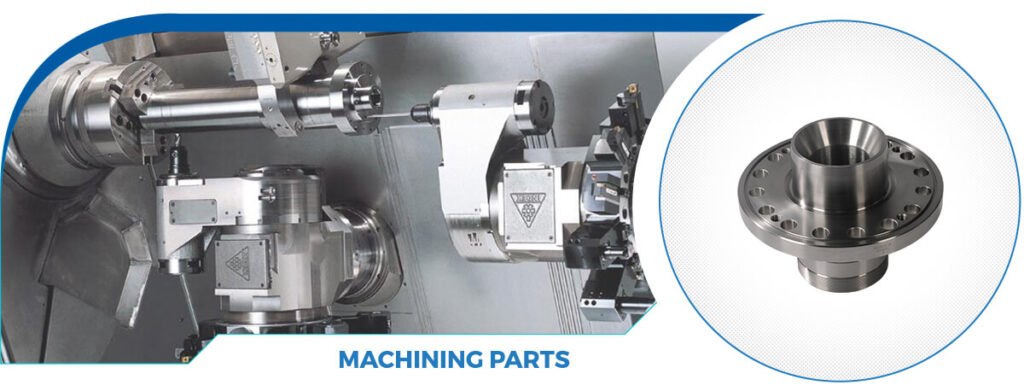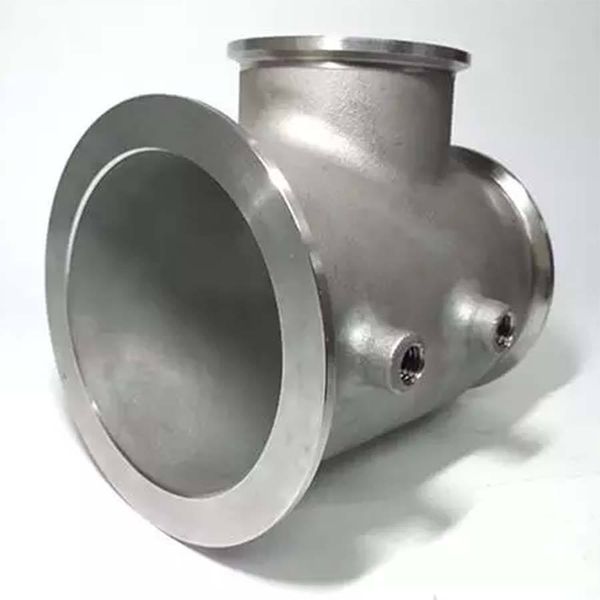Custom castings with CNC machining service involve the combination of two manufacturing processes: casting and CNC machining. Here’s an overview of how the process works:
- Casting: The first step is to create a custom casting using a casting method such as sand casting, investment casting, or die casting. This involves pouring molten metal or other materials into a mold to create the desired shape. The mold is typically made from a pattern or a 3D model of the part.
- CNC Machining: Once the casting has solidified and cooled, it may undergo CNC machining to achieve the final desired specifications. CNC (Computer Numerical Control) machining is a precise and automated manufacturing process that uses computer-controlled machines to remove material from the casting and shape it into the desired form. CNC machines can perform various operations such as milling, turning, drilling, and grinding.
- Design and Programming: The initial step in the process involves designing the part using computer-aided design (CAD) software. The design specifies the dimensions, features, and tolerances required for the final part. Next, the CAD design is converted into a CNC program that guides the machining process.
- CNC Machining Operations: The CNC machine reads the program and carries out the machining operations on the cast part. The specific operations depend on the requirements of the part and may include milling to remove excess material, drilling holes, tapping threads, or creating intricate surface finishes.
- Finishing and Quality Control: After CNC machining, the part may undergo additional finishing processes such as deburring, polishing, or surface treatment to achieve the desired appearance and functional properties. Quality control measures are also implemented throughout the process to ensure that the final part meets the required specifications.

Benefits of Custom Castings with CNC Machining Service:
- Flexibility: This combination allows for the production of complex shapes and intricate designs that may be challenging to achieve with either process alone.
- Precision: CNC machining offers high accuracy and repeatability, ensuring tight tolerances and consistent quality.
- Cost-effectiveness: Casting can be a cost-effective method for producing large quantities of parts, while CNC machining provides the precision required for critical features or low-volume production.
- Material Options: Custom castings can be made from a wide range of materials, including metals, alloys, and certain types of plastics, allowing for versatility in material selection.
Overall, custom castings with CNC machining service provide a comprehensive solution for producing high-quality, complex parts with precise dimensions and finishes.

Applications of our custom castings and CNC machining parts
Custom steel castings and CNC machining parts have a wide range of applications across various industries. Here are some common applications:
Automotive Industry: Steel castings and CNC machining parts are widely used in the automotive industry for components such as engine blocks, cylinder heads, transmission housings, suspension components, and braking systems. These parts require high strength, durability, and precision.
Aerospace Industry: The aerospace sector relies on steel castings and CNC machining parts for critical components like turbine blades, engine casings, landing gear, and structural components. These parts need to withstand extreme temperatures, high stress, and rigorous performance requirements.
Oil and Gas Industry: Custom steel castings and CNC machining parts find applications in the oil and gas industry for equipment such as valves, pumps, compressors, and drilling components. These parts must be able to withstand harsh operating conditions, corrosive environments, and high-pressure situations.
Heavy Machinery and Equipment: Steel castings and CNC machining parts are used in the production of heavy machinery and equipment, including construction machinery, mining equipment, agricultural machinery, and industrial machinery. These parts provide strength, durability, and precision in demanding working environments.
Power Generation: Power plants and energy generation facilities utilize steel castings and CNC machining parts for components like turbine blades, generator housings, heat exchangers, and valves. These parts are critical for efficient and reliable power generation.
Infrastructure and Construction: Custom steel castings and CNC machining parts play a vital role in infrastructure and construction projects. They are used for structural components, supports, brackets, and fittings that require strength, precision, and reliability.
Medical Equipment: In the medical field, steel castings and CNC machining parts are utilized for manufacturing surgical instruments, orthopedic implants, prosthetics, and medical device components. These parts require biocompatibility, precision, and high-quality finishes.
Marine Industry: Steel castings and CNC machining parts are used in the marine industry for applications such as shipbuilding, offshore structures, propellers, and marine engine components. These parts need to withstand harsh marine environments, including corrosion and high-stress conditions.
These are just a few examples, and the applications of custom steel castings and CNC machining parts extend to numerous other industries, including defense, railways, telecommunications, and more. The versatility, strength, and precision offered by these manufacturing processes make them suitable for a wide range of applications.
